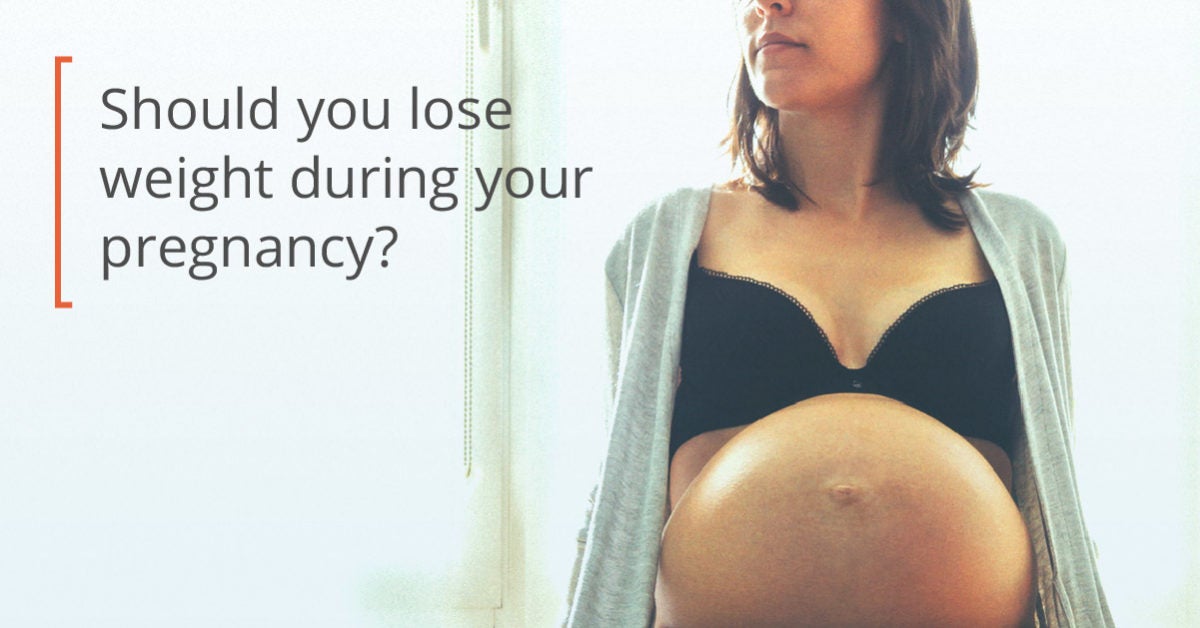It's these women whom doctors especially want to educate about healthy weight gain during pregnancy, she added. However, "many women don't see their OBs [obstetricians] until the end of the first trimester, so we need to get the word out" in other ways, Oken said. In order to keep weight gain within the guidelines, Oken recommends that women focus on eating nutrient-dense foods , including fruit, dairy products and nuts, and especially avoid "empty" calories or extra desserts. Also, pregnant women should try to avoid drinking their calories in sugar-sweetened beverages, and instead make sure to drink plenty of water, as the symptoms of thirst such as fatigue and irritability can sometimes be mistaken for hunger, she said.
Pregnancy can be stressful, and focusing so much on being perfect causes needless worrying during pregnancy, said Katherine Tallmadge, a registered dietitian and an op-ed contributor to Live Science. It's OK to indulge occasionally, but it's still important to be smart about such indulgences in order to avoid overgaining, Tallmadge told Live Science. So, when moms-to-be treat themselves, they should try for smaller amounts or stay on the healthier side of the "treat," she said. For example, if you're craving pizza, go for vegetable, she said.
Women who have gained too much shouldn't get discouraged, because everyone gains weight at different rates, Nicklas said. Women who do gain too much early on in pregnancy should try to slow their rate of weight gain as their pregnancy progresses, she said. Women who have a BMI greater than 35 before getting pregnant may not have to gain any weight during pregnancy, she said. However, doctors don't recommend that women intentionally try to lose weight during pregnancy, Nicklas added.
After giving birth, the last thing that's likely on a new mom's mind is going on a diet.
Overweight and pregnant: How to manage weight gain during pregnancy | BabyCenter
And according to Cheryl Lovelady, a professor of nutrition at the University of North Carolina at Greensboro, that's just fine. And over the next few weeks, a woman can also expect to lose the weight of the extra fluid in her body that built up during pregnancy. After the fluid is gone, what remains is the extra fat that the woman added during pregnancy.
Women should be able to lose their extra weight by six months after they give birth, Lovelady said. However, in reality, women will likely lose more weight at the beginning, and the weight loss will slow as they get closer to their goals, she said. By the end, it may be only 1 pound per month, but that weight loss will be a pound of fat, as opposed to fluid, she added.
Not all of the experts agreed that all of the weight had to come off within six months. However, 12 months seems to be the upper limit for how long it should take for women to lose all of their pregnancy weight. That means women who started out at a normal BMI before pregnancy should aim to return to a normal BMI, and women who were overweight or obese before pregnancy should aim to return to their pre-pregnancy weight, and then continue losing weight, if possible, Nicklas said.
Nicklas added that the current research suggests that women who don't lose their weight within this time period are at greater risk of retaining the weight for the long term.
Causes of Excessive Postpartum Weight Loss
But because " the period of time between two pregnancies will be variable — and with approximately 50 percent of pregnancies being unplanned — timing for weight loss can be challenging," she said. With the exception of breast-feeding discussed below , losing the baby weight is really no different from losing weight at any other point in life, according to the experts who spoke with Live Science.
Indeed, in her review of studies on the topic, published in the journal Obesity Reviews , van der Pligt concluded that "overall, programs which target combined nutrition and physical activity strategies have been more effective than those which focus on just one of these. In the review, van der Pligt and her colleagues reviewed data from 11 studies that were focused on postpartum weight-loss interventions. They found that seven of the studies involved interventions that were effective in helping women lower their weight retention after pregnancy, and that, of these, six included both dietary and physical activity components, according to the review.
Why You May Be Losing Weight While Pregnant
The authors concluded, however, that "the optimal setting, delivery, intervention length and recruitment approach" for the most effective interventions remain unclear. A meta-analysis published in the journal Cochrane Database of Systematic Reviews reached similar conclusions. Looking at data from 14 studies, the authors found that "diet combined with exercise or diet alone compared with usual care seemed to help with weight loss after giving birth" but that further research is needed. Van der Pligt stressed that "diet and exercise" don't mean women need to go on an extreme diet or start training for a marathon.
Several studies suggest that making small changes can be helpful for losing pregnancy pounds. For example, in the Active Mothers Postpartum trial, which enrolled overweight and obese postpartum women, cutting out junk food and being less sedentary were associated with postpartum weight loss. Lovelady, who was an author on that study, noted that these results were specific to overweight and obese women.
Women who start out at a normal weight and gain within the guidelines usually don't have an issue with postpartum weight retention, she said. Overall, a woman should be able to follow any healthy diet after pregnancy to lose weight, Lovelady said. Diets such as Weight Watchers, a Mediterranean diet or a vegetarian diet can all be good options, she said.
In addition, another, smaller study from Sweden — which included 68 overweight or obese women, all of whom were breast-feeding — found that dietary changes had the greatest impact on postpartum weight loss. Beginning at 10 to 14 weeks postpartum, the women were randomly divided into four groups for a week intervention. One group was counseled about their diet, another on diet and exercise, and another on exercise alone. The fourth group received no advice and served as a control group, for comparison. The women in the diet-only group not only lost the most weight but were also the only group that continued to lose weight nine months later, according to the study.
Rasmussen, who was an author on the study, noted that the dietary changes the women made were not major. The intervention focused on cutting out junk food, eating more vegetables and eventually reducing the overall number of calories the women were consuming, she told Live Science. One limitation of the study, however, was that the exercise component was not a huge change from the amount of physical activity the women were getting prior to starting the study, Rasmussen said.
Take Your Time
So, while they did adhere to the exercise requirements, it didn't represent a substantial increase in their energy expenditure, she said. She said, for weight loss, she recommends a diet that highlights nutrient-dense calories and avoids empty calories. And although diet appears to be the driving factor in losing the baby weight and exercise doesn't have a huge effect on weight loss, the experts agreed that it's still important for new moms to get back to moving as soon as possible. Yes, gone are the days when women were confined to bed rest after giving birth — certainly, a woman should take care of herself and recover from giving birth, but it's important to get moving, Rasmussen said.
But women interested in doing more vigorous activity, such as lifting weights, should ask their OB when they can start, she added.

All of the experts we spoke with agreed: Walking is a great way for new moms to get exercise. Walking during the postpartum period has been shown to have excellent health benefits, van der Pligt said. Plus, it's convenient and cheap, and can be an important social activity for new moms, she added. In one of Lovelady's studies, for example, the women started their walking program at four weeks postpartum and gradually built up to walking for 45 minutes a day, five days a week, Lovelady said.
The women in the study had been largely sedentary for the previous three months, however, she added. For most women, moderate exercise during pregnancy is considered safe and healthy. It's also important to reduce inactivity. In a study published in the American Journal of Preventive Medicine, researchers looked at the effects of television viewing, walking and trans-fat consumption on postpartum weight retention. They found that women who watched less than 2 hours of television a day, walked for at least 30 minutes a day and limited their consumption of trans fat had a decreased likelihood of retaining at least 11 lbs.
Although researchers know that physical activity alone does not appear to cause weight loss, in combination with a healthy diet, regular exercise helps to maintain the weight loss that occurred, said Oken, who was the lead author of the study.
Although all of the experts interviewed agreed that diet and exercise strategies for postpartum weight loss don't really differ from the strategies one would employ for weight loss at any other time of life, after giving birth, women may have one unique advantage: breast-feeding. For example, in Rasmussen's study , published in The American Journal of Clinical Nutrition, the researchers concluded that " breast-feeding could also make a meaningful contribution, eliminating [postpartum weight retention by 6 months] in many women.
Nicklas noted that, while full breasts may feel heavier, in reality, they wouldn't contribute much to a breast-feeding woman's weight. Certainly, there are several factors that play a role in whether breast-feeding has an effect on weight loss , including how intensively and how long a woman breast-feeds, Rasmussen said. But generally speaking, the more a woman breast-feeds, the greater an effect it will have on her weight loss, she said.
Simply put, breast-feeding burns calories — the body requires extra energy to make milk. However, this might not be the entire explanation, Rasmussen said. You always remember to bring food for the baby, so include something healthy for you, like a mozzarella cheese stick or half a peanut butter sandwich on whole wheat bread. It keeps your energy up and stops you from succumbing to fast-food drive-thru when you realize you haven't eaten all day. If I'm not hungry I don't eat. You don't need to have lunch just because the clock says 12 p. On the flip side, there will also be days when all you want to do is eat -- but if you keep only low-fat and nutritious foods at home, then you won't have to feel too guilty for snacking a bit more than normal.
I wouldn't let myself buy any new clothing, so my choices were maternity wear or pre-pregnancy wear. With almost nothing that fit, I knew I had to lose the weight before the end of my maternity leave so I'd have something to wear to the office. So I hired a personal trainer who really kicked my butt twice a week.
- Post Pregnancy Weight Loss.
- Five stages of losing weight after pregnancy.
- The truth about baby fat.
- How much weight to gain if you're pregnant and overweight or obese.
- 5 Reasons You're Not Losing Weight After Your Baby.
- Lose the Baby Weight for Good: 18 Real Moms Tell You How.
I attribute it all to my dog. Plus, every night I aim to do crunches and 25 push-ups before I hit the sack. So even if can't make it to the gym during the day, at least know I did a little something to help.
